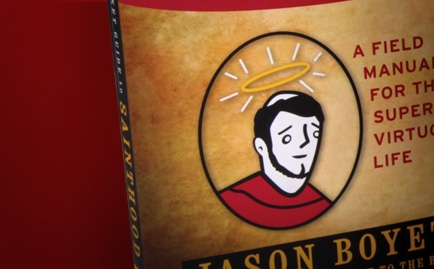I have a friend named Jared.
Jared is pretty particular about his name. It’s not "Jer" or any kind of truncated version of the name. It’s Jared, plain and simple.
However, Jared doesn’t always enunciate his words very well. In fact, when asked what his name is, he kind of slurs it a bit. Consequently, many people mistakenly call my friend "Jerry," which he absolutely hates. Being a good friend the first time I heard that, I immediately capitalized off of the opportunity to push a button of his and started calling him "Jerry" whenever possible.
I traveled with Jared for a year. We lived together in a van and spent our days visiting different churches and ministries, playing music for anyone who would listen. We stayed in host homes and were constantly being introduced to our new "families." Nine times out of 10 when Jared would introduce himself, the warm and welcoming family would respond with a smile, "It’s nice to meet you, Jerry." My friend would grit his teeth but say nothing in response. The few times that he did speak up, nobody paid any attention.
Poor Jared. I always felt bad for the guy (but that didn’t stop me from making fun of him). What was sad was not that people were making mistakes; of course, everybody can make a mistake. What was sad was that nobody took the time to listen to Jared after they thought they knew his name. He’d try to correct people or steer them back in the right direction, but at that time, they had already made up their minds—this was Jerry they were talking to.
What’s even sadder is that my friend eventually acquiesced and started responding to the name "Jerry." What else could he do? They had already made up their minds.
In a way, I feel like that’s sometimes how we treat the poor. We have this caricature in our minds of what poor or homeless people are like. We may take a little time to meet someone living on the streets, but from that first impression (and in fact, even before then) we have a determination of who these people are. As a result, we stop listening to their stories. Everything we hear is filtered through our preconceived notions about what it means to be poor. Pick whatever stereotype you like—whether it be that they are lazy, addicted, uneducated or worse. Whatever you’ve been taught or even what your limited experience has lent itself to becomes your whole paradigm for how you view poverty.
At least, that’s how it was for me. And I still have to fight it.
You see, I’ve met some poor people, become friends with them, even. And after a while, you start noticing similarities in their lives … to the point that you can even believe that you know any poor person without really knowing them at all. The danger, of course, is that we can take this to the extreme of no longer listening to people’s stories, no longer giving them the dignity of hearing out their stories. And what a tragedy that would be.
There’s also another danger to this—the poor, like Jared, might actually start believing what you believe about them. That they’re stupid. That they’re just no-good drains on society. That they will never be good for anything than picking through garbage.
Admit it: sometimes you just don’t listen. You feel like you know someone because they happen to be poor or rich, because they come from a particular part of the country or aren’t from this country at all, because they believe in God or they don’t. But how would this habit of pre-judging people change if you knew that what you believed about a person determined what they believed about themselves? Would you take more time to get to know them? I hope so.
Time to spill the beans: How have you neglected listening to someone’s story, to calling someone "Jerry" instead of "Jared"?





















